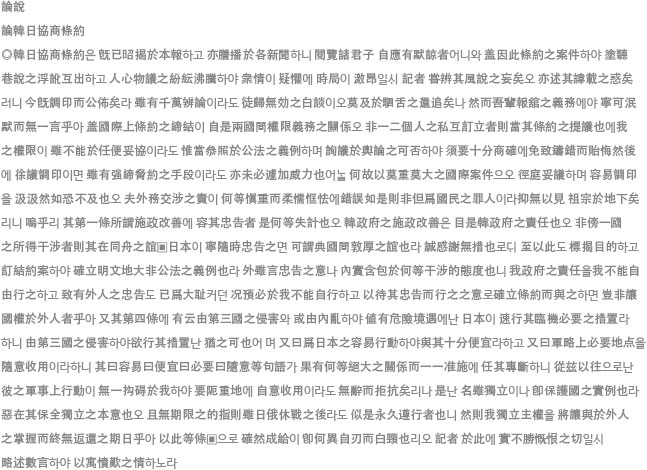



![]() > Media Center > Dokdo, the First Victim of Japan’s Aggression Against the Korean Peninsula > Korean People’s Awareness of Japan’s Aggression
> Media Center > Dokdo, the First Victim of Japan’s Aggression Against the Korean Peninsula > Korean People’s Awareness of Japan’s Aggression
Hwangseong Shinmun
Editorial
“Criticizing the Korea-Japan Treaty of 1904”
This newspaper previously carried the Korea-Japan Treaty,and other newspapers copied and spread it. Many have read it and are groping to fully understand its significance, thouth they remain silent outwardly. Mostly, wild rumors about the treaty are circulating in the streets and people are feeling jittery and suspicious, leaving the situation unstable and volatile. i, a reporter, checked the absurdity of the rumors myself and made judgments on them, and hereby describe doubts about falsely-reported facts. But to what use? The treaty has been signed and promulgated. Tens of millions of arguments would go in vain and fall short of the rolling of a wheel or a tongue. Nevertheless, we, being journalists, cannot just remain silent and not utter a single word.
international treaties generally define the relations of rights and duties between two nations and are not private contracts among individuals. Though we the Koreans cannot have only our way in such treaties, they should still be worked out only by referring to the practices of international law. Public opinion and approval should be heeded and sought. Any decision should be mate only after thorough discussion. By doing so errors can be avoided and lessons learned. This allows the signing of a treaty to take its due course, and even when the other party is forcing its conclusion through threats, it cannot just force its way and rush the course. Then, why on earth did [the ministers of the Korean government] negotiate an international treaty of great importance in a way that is completely different from the above and hurry its prompt signing as if out of fear of failing to do so? In general, those responsible for diplomatic negotiations should be prudent and even fearful to some degree. With an error of this magnitude, they are not only sinners against their people but will also be ashamed to meet all the late kings in the nether world. Alas!
Article 1 of the treaty stipulates that the imperial Government of Korea shall allow the Imperial Government of Japan to provide it with adivce on possible improvements of its administration. What grave an error that is! The imporvement of the korean government’s administration is the responsibility of the Korean government alone, and no neighboring countries should interfere with it. it is a duty required of passengers aboard the same boad or neighboring countries. If Japan should restrict itself merely to Providing sound advice, it would be regarded as sincere loyalty and cordial between parties responsible for governing a nation. Wewould be sincerely grateful for the lack of interference. if there is interference, even when Japan establishes express provisions by indication its purpose and revising the treaty, it would still be a serious violation of the practices of international law.
Though Article 1 offers advice outwardly, it in fact connotes an attitude of interference. It would already be a great shame if our government cannot freely assume its own responsibility and takes advice from outside. Even more, if we write and allow a treaty on the premise that we are bound not to be able to freely take on our own responsibility and will wait for and act on another country's advice, how would it be any different from entrustion our national sovereignty to an outsider?
Also, Article 4 of the treaty states that if the welfare of Korea is endangered by aggression by a third power of internal disturbances, Japan shall immediately take such necessary measures as required by circumstance.
It would be understandable if Japan took such measures due to aggression by a third power, but it is truly incomprehensible that the provision mentions internal distubances. If there is ever a disturbance or uprsing by a gang of bandits within our territory, our soldiers are more than capable to repress such rebellion. There is no need to wait for action by soldiers from outside.
Article 4 continues to state that Korea shall give full facilities to ensure prompt action by Japan and the latter may arbitrarily occupy such places as may be necessary from a military strategic viewpoint. How absolute are the relations that the execution of each of the terms used such as "prompt action," "facilities," "necessary,"and"arbitranily" should be left to Japns's arbitrary decision? From now on, Japan will freely take military actions irrespective of what the Koreans think and arbitrarily occupy important place, and we will not be able to utter a word of resistance. This means that Korea is independent only in name, and in reality, it is actually a protectorate. Now how can we preserve independence in its true meaning? Moreover, the treaty has no defined thrm, which means the terms of the treaty will be eternally adhered to even after Japan and Russia agree to a truce. Therefore, our independence and sovereighty will remain in the hands of the outsider with no date of their return specified.
With this treaty that puts these terms in writing, how can it be any different from sticking out our necks onto the blade?
It is beyond deplorable and I, a reporter, express this overwhelming grief I feel in this brief account.
